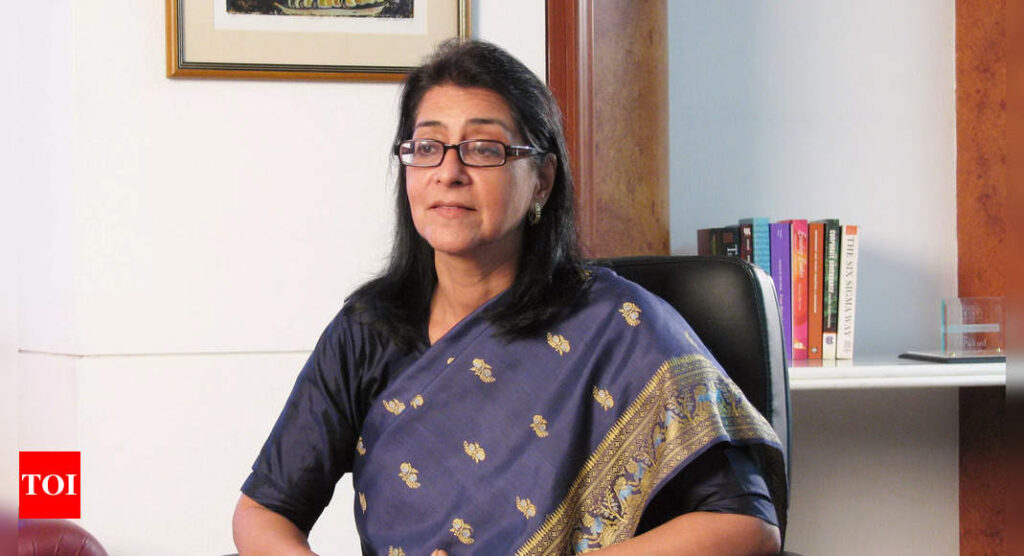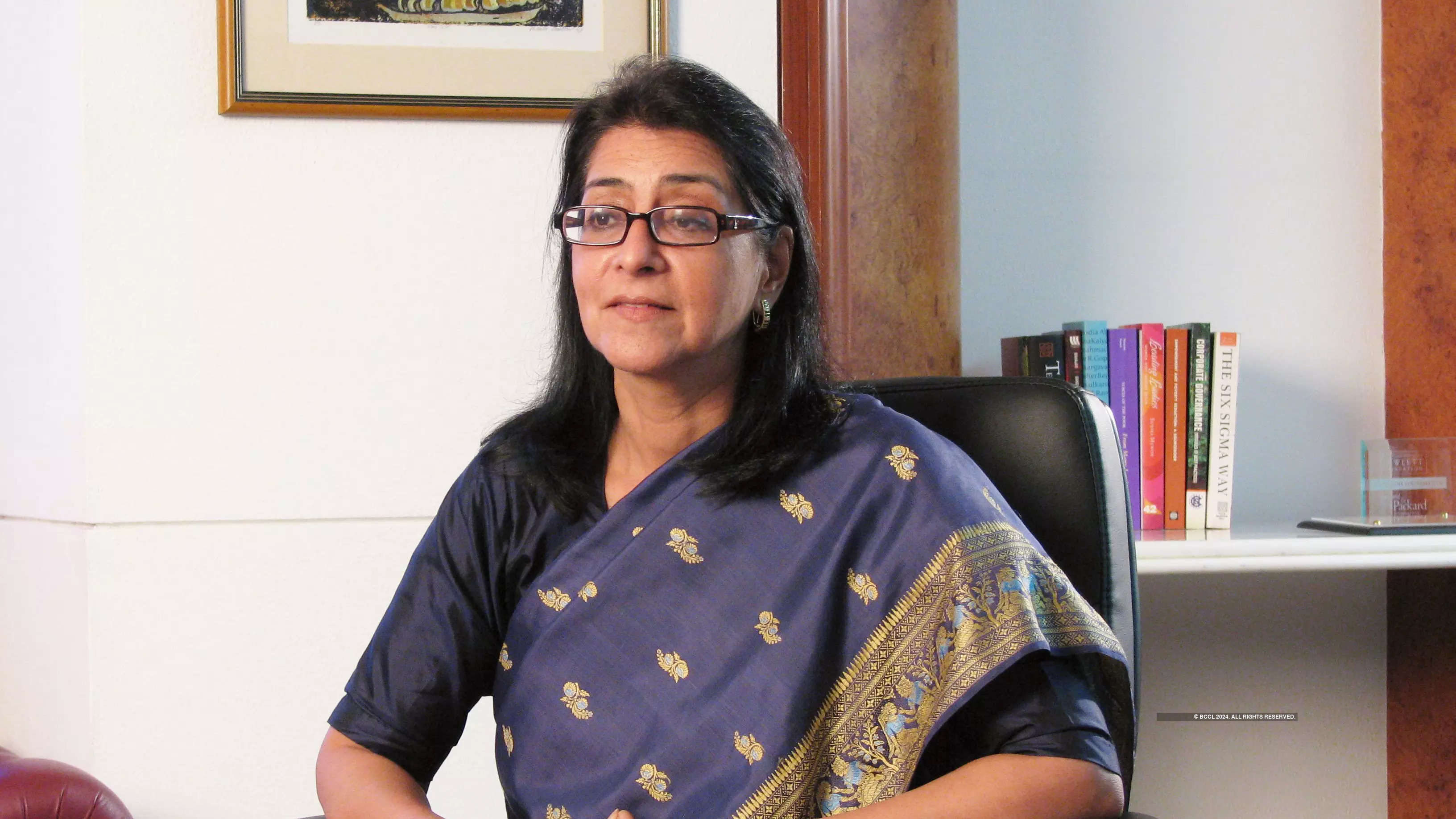By Naina Lal Kidwai
Finance Minister Nirmala Sitharaman’s sixth Budget which is an interim budget promises to be responsible despite this being an election year. The budget talks about inclusive development both, social and geographical, especially for youth, women, farmers, and the poor. Continued focus on improving logistics through infrastructure spend on roads, rail, airports, ports increases productivity for companies and citizens alike.
To make ‘Viksit Bharat’ by 2047, the government’s focus is on improving and empowering people’s capabilities through various skilling initiatives. It is encouraging to see that Skill India Mission has succeeded in training more than 1.4 crore youth and upskilling and reskilling 54 lakh youth. I am particularly happy to see the continued focus on youth and women entrepreneurship and the announcement of a new fund which will give interest free 50 year loans for startups will provide a domestic fillip to startups supplementing venture capital we have traditionally relied on from abroad.
PM Mudra Yojana has sanctioned 43 crore loans aggregating to 22.5 lakh crore to youth entrepreneurs and thirty crore Mudra Yojana loans to women entrepreneurs. There are several other schemes like Fund of Funds, Start-Up India, and Start-Up Credit Guarantee schemes that are assisting our youth. Further, the extension of tax benefits to Start-ups and investments made by sovereign wealth funds/pension funds, till 31st March 2025 depicts the government’s effort to support the startup eco- system.
This aligns quite well with India Sanitation Coalition’s efforts to give impetus to the start-up world. Over the past 7 editions of our ISC-FICCI Sanitation Awards, we have recognized and promoted several start-ups in the sanitation space, many of whom are successful businesses now!
While the finance minister did not provide detailed information on Water, Sanitation, and Hygiene (WASH), the budget allocation sees a slight increase in spend demonstrating continued focus on this highly successful program. The acknowledgement that the private sector has increasingly played a substantial role in addressing WASH issues in both urban and rural areas, with numerous projects underway through Public-Private Partnerships (PPPs), highlights the government’s commitment to addressing challenges in this sector.
A perfect example is the LightHouse Initiative initiated by the Department of Drinking Water along with the India Sanitation Coalition (ISC) by partnering with major corporates across India to develop model villages in Solid and Liquid Waste Management (SLWM) under SBM-Grameen. From this budget, there is an expectation that the government will persist in prioritizing Public-Private Partnerships (PPP) as the path toward achieving the country’s Sustainable Development Goal 6 (SDG 6). Additionally, it is hoped that the government will uphold its commitment to making necessary infrastructural investments for SLWM.
The budget speech rightly celebrates the fact that we have 83 lakh SHGs and 9 crore women beneficiaries. The microfinance movement in the country and the possibility of empowering women members of SHGs through livelihood skilling is a key to bringing women into mainstream economic advancement.
The focus on green growth, rooftop solar, wind, biomass, e-vehicles all help with our green energy thrust. The tourism sector was mentioned and could be a huge job provider for youth and women.
Guided by the principle ‘Reform, Perform, and Transform’, the budget emphasizes efficient implementation of various policies by improving coordination with states and relevant stakeholders. This is critical both for infra spend and social programs
It is noteworthy that ISC’s Climate Resilient Coastal Cities project which is being implemented in PPP (Public-Private Partnership) mode in four coastal states of Karnataka, Gujarat, Goa and Maharashtra is congruent with the government’s priority of promoting climate-resilient activities for the blue economy 2.0, a scheme for restoration and adaptation measures, and coastal aquaculture.
The budget also focuses on the Aspirational districts program where assistance will be given to the states for faster development of aspirational districts and blocks, including the generation of ample economic opportunities. This is again very crucial as it has a huge potential to transform the landscape of our country while making sure no -one is left behind.
Overall, this budget has embraced economic strategies and develops the building blocks that nurture and uphold growth, promote inclusive and sustainable development, and enhance productivity.
(Naina Lal Kidwai is Chair India Sanitation Coalition and Chair Rothschild & Co Indía)
Finance Minister Nirmala Sitharaman’s sixth Budget which is an interim budget promises to be responsible despite this being an election year. The budget talks about inclusive development both, social and geographical, especially for youth, women, farmers, and the poor. Continued focus on improving logistics through infrastructure spend on roads, rail, airports, ports increases productivity for companies and citizens alike.
To make ‘Viksit Bharat’ by 2047, the government’s focus is on improving and empowering people’s capabilities through various skilling initiatives. It is encouraging to see that Skill India Mission has succeeded in training more than 1.4 crore youth and upskilling and reskilling 54 lakh youth. I am particularly happy to see the continued focus on youth and women entrepreneurship and the announcement of a new fund which will give interest free 50 year loans for startups will provide a domestic fillip to startups supplementing venture capital we have traditionally relied on from abroad.
PM Mudra Yojana has sanctioned 43 crore loans aggregating to 22.5 lakh crore to youth entrepreneurs and thirty crore Mudra Yojana loans to women entrepreneurs. There are several other schemes like Fund of Funds, Start-Up India, and Start-Up Credit Guarantee schemes that are assisting our youth. Further, the extension of tax benefits to Start-ups and investments made by sovereign wealth funds/pension funds, till 31st March 2025 depicts the government’s effort to support the startup eco- system.
This aligns quite well with India Sanitation Coalition’s efforts to give impetus to the start-up world. Over the past 7 editions of our ISC-FICCI Sanitation Awards, we have recognized and promoted several start-ups in the sanitation space, many of whom are successful businesses now!
While the finance minister did not provide detailed information on Water, Sanitation, and Hygiene (WASH), the budget allocation sees a slight increase in spend demonstrating continued focus on this highly successful program. The acknowledgement that the private sector has increasingly played a substantial role in addressing WASH issues in both urban and rural areas, with numerous projects underway through Public-Private Partnerships (PPPs), highlights the government’s commitment to addressing challenges in this sector.
A perfect example is the LightHouse Initiative initiated by the Department of Drinking Water along with the India Sanitation Coalition (ISC) by partnering with major corporates across India to develop model villages in Solid and Liquid Waste Management (SLWM) under SBM-Grameen. From this budget, there is an expectation that the government will persist in prioritizing Public-Private Partnerships (PPP) as the path toward achieving the country’s Sustainable Development Goal 6 (SDG 6). Additionally, it is hoped that the government will uphold its commitment to making necessary infrastructural investments for SLWM.
The budget speech rightly celebrates the fact that we have 83 lakh SHGs and 9 crore women beneficiaries. The microfinance movement in the country and the possibility of empowering women members of SHGs through livelihood skilling is a key to bringing women into mainstream economic advancement.
The focus on green growth, rooftop solar, wind, biomass, e-vehicles all help with our green energy thrust. The tourism sector was mentioned and could be a huge job provider for youth and women.
Guided by the principle ‘Reform, Perform, and Transform’, the budget emphasizes efficient implementation of various policies by improving coordination with states and relevant stakeholders. This is critical both for infra spend and social programs
It is noteworthy that ISC’s Climate Resilient Coastal Cities project which is being implemented in PPP (Public-Private Partnership) mode in four coastal states of Karnataka, Gujarat, Goa and Maharashtra is congruent with the government’s priority of promoting climate-resilient activities for the blue economy 2.0, a scheme for restoration and adaptation measures, and coastal aquaculture.
The budget also focuses on the Aspirational districts program where assistance will be given to the states for faster development of aspirational districts and blocks, including the generation of ample economic opportunities. This is again very crucial as it has a huge potential to transform the landscape of our country while making sure no -one is left behind.
Overall, this budget has embraced economic strategies and develops the building blocks that nurture and uphold growth, promote inclusive and sustainable development, and enhance productivity.
(Naina Lal Kidwai is Chair India Sanitation Coalition and Chair Rothschild & Co Indía)


